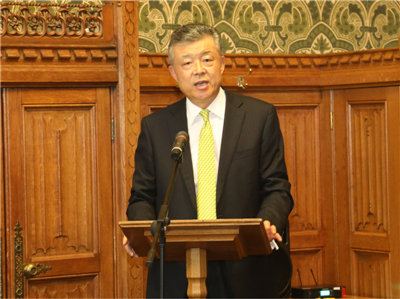Keynote Speech on the Belt and Road Initiative by H.E. Ambassador Liu Xiaoming at the British Parliament: New Stage, New Opportunities, New Role
Chinese Embassy in the UK | Updated: 2019-06-26 17:19

Mr. Faisal Rashid,
My Lords and MPs,
Ladies and Gentlemen:
Good afternoon!
It is a real delight to join you again at the Parliament and talk about Belt and Road cooperation.
Over the past few years, Belt and Road Initiative (BRI) appeared most frequently in both my discussions with British friends and my speeches at various events around Britain.
Last April, the second Belt and Road Forum for International Cooperation was successfully held in China. During the Forum, 283 outcomes were reached.
Last week, Vice Premier Hu Chunhua of China paid a successful visit to the UK and co-chaired the tenth China-UK Economic and Financial Dialogue with Chancellor Hammond. Among the fruitful outcomes, the Shanghai-London Stock Connect is definitely a highlight. The two sides also signed an MOU on third market cooperation, agreeing to deepen cooperation on BRI project financing and build closer sub-regional partnership.
Recently, what I have been thinking about most is: What more can we do to take China-UK cooperation on BRI to a new level? Now I would like to share with you my views from three perspectives:
· How do we understand the new stage of BRI development?
· How do we seize the new opportunities?
· What is our role?
To begin, let me quote a Chinese adage.
"With strong roots, plants will grow;
With right approach, people will succeed."
The second Belt and Road Forum for International Cooperation charted the course for high-quality BRI. This marks a new stage in BRI development. How do we understand this new stage?
In my opinion, the first step to understanding this new stage is to have an accurate judgment of the trend of the times.
The world is undergoing profound changes unseen in a century. This is highlighted by the new round of scientific, technological and industrial revolution, and the deep adjustment in the global economic landscape and governance.
Against this background, countries in the world are actively exploring new paths for development and new ways to improve global economic governance.
However, at the same time, unilateralism and protectionism are on the rise. In particular, economic globalization is ignored by its once leader, whose backpedaling and "us-first" approach has turn it into a unilateral bully in international trade and a source of instability hindering economic recovery and threatening the tranquility in the world.
BRI, which was proposed by President Xi Jinping, goes along with the historical trend of economic globalisation, answers the call of our times for reform in the global governance system, and meets the strong aspiration of the people of all countries for a better life.
In the past six years since it was proposed, BRI has followed the principles of peace, development, openness, inclusiveness and win-win cooperation. It has become a platform for international cooperation with extensive participation: 131 countries and 30 international organisations have signed documents with China on BRI cooperation.
The past six years saw the blueprint for BRI sketched out. We could compare that to "freehand brushwork" in Chinese painting. Now, in the new stage of BRI development, it's time to attend to the details of the blueprint with "fine brushwork".
First, the guidelines will be clearer.
In the new stage, BRI cooperation will focus on translating the principles of extensive consultation, joint contribution and shared benefits into concrete outcomes. This will need all participating parties to leverage their respective strengths. Through such cooperation, BRI partners will advocate and uphold multilateralism with concrete action.
In the new stage, BRI cooperation will be open, green and clean. This means building an open world economy, protecting our planet that's vital for human survival and ensuring project transparency.
In the new stage, BRI cooperation will follow high standards, deliver more benefits to the people and increase sustainability. To achieve these goals, we must introduce broadly-endorsed rules and standards, make tangible contribution to local economic and social progress, and make sure that cooperation projects not only start well but also finish well.
Some people regard BRI as China's version of the "Marshall Plan". They see it as a geopolitical tool and even dissuade other countries from taking part in BRI by every possible means. BRI is a new concept, but these people choose to look at it through the old prism of the "Cold War". No wonder they come to the conclusion that this is a "zero-sum game" in which one party's gain is another's loss.
The fact is BRI is an economic initiative that promotes open and inclusive cooperation. It is not aimed at excluding or replacing anyone, still less forming an exclusive geopolitical alliance or, in their words, "China club". Anyone can join in. No one has the right to stop others from doing so. Countries willing to sow the seeds of cooperation would have the opportunity to harvest the fruit of development.
Second, the priorities will be in sharper focus.
In the new stage, BRI cooperation will focus on reaching the following five goals:
· improving infrastructure,
· encouraging innovation,
· opening the market,
· providing financial support
· and delivering benefit to the people.
In specific,
· Building infrastructure that is high-quality, sustainable, resilient, affordable, inclusive and accessible will cement the bedrock of connectivity.
· Deepening cooperation on frontier technology such as smart manufacturing and digital economy will provide new driving force for BRI development.
· Facilitating trade and investment and opposing protectionism will create a broader space for development.
· Bringing in more multilateral financial institutions and financial institutions from different countries will foster a diverse financing system and a multi-tiered capital market.
· Carrying out diverse forms of cultural cooperation and people-to-people exchanges will deliver the benefit of BRI to more people.
Some people claim that BRI only serves the interests of China while pushing other countries into the "debt trap". This is completely groundless. BRI projects are joint decisions of China and other participating countries. They are not "imposed on anyone" or designed to "frame" any other country.
As of today, China and countries along the BRI routes have set up 82 overseas cooperation parks. These parks have paid more than 2 billion dollars in tax and fees to host countries and created close to 300,000 jobs for the local communities.
China would never use its strength to bully other countries or strong-arm anyone to do deals on its terms. BRI is not a "pitfall" that hinders development. BRI is a "pie" for everyone to share.
Third, the structure will be improved.
In the new stage, BRI development will follow the guidance of the Belt and Road Forum for International Cooperation and rely on the support of bilateral and multilateral platforms in different areas. Upgraded "hard connectivity" will be achieved through China Railway Express trains, new routes across land and over sea, economic and trade industrial cooperation parks, and economic corridors. Cooperation in the areas of science, education, culture, health care and people-to-people exchange will provide institutional guarantee for better "soft connectivity".
Not long ago, some Western politicians clamoured for "clash of civilisations" between China and the US. I think this is due to lack of understanding on the time-honoured and inclusive Chinese civilisation. It reflects the bias, narrow-mindedness and ignorance of these politicians.
One cannot help questioning the agenda behind the attempts to discredit China's progress with the absurd theory of "clash of civilisations". If countries all retreat to their own isolated islands, human civilisation would lose its dynamism.
In history, the ancient Silk Road through deserts and across seas had greatly boosted the exchanges and mutual learning between Eastern and Western civilisations. It was an important contribution to the openness, connectivity, development and prosperity of mankind.
BRI carries on this spirit.
· It builds bridges for communication and friendship.
· It enhances exchanges to prevent misunderstanding.
· It promotes mutual learning to free the world from conflicts.
· It encourages co-existence over the sense of superiority of one civilisation over the other.























